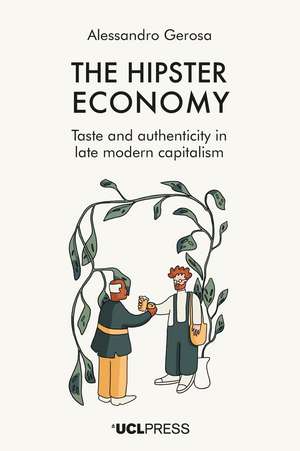Hipster Economy: Taste and Authenticity in Late Modern Capitalism
Autor Alessandro Gerosaen Limba Engleză Paperback – 26 aug 2024
The Hipster Economy gives hipsterism the serious analysis it deserves, through which he reveals the importance of hipster aesthetics, based on authenticity, for today’s consumption-based economy.
Since being authentic has become an aspiration and an imperative, the notion of authenticity shapes the consumption habits of individuals in the most diverse contexts such as food and drinks, clothing, music, tourism, and the digital sphere. It even transforms urban areas and their local economies. In this book, Alessandro Gerosa analyzes this complex set of related phenomena to argue that the quest for authenticity has been a driver of Western societies from the emersion of capitalism and industrial society to today.
The Hipster Economy provides a historically and sociologically grounded explanation of the value of authenticity in the contemporary economy and society, through which it shows why and how authenticity has become a fundamental value orienting consumers' taste in late modern capitalism. In clear and convincing writing, Gerosa proposes a novel conceptualization of the aesthetic regime of consumption and an analysis of how the hipster economy impacts the urban space.
| Toate formatele și edițiile | Preț | Express |
|---|---|---|
| Paperback (1) | 156.53 lei 3-5 săpt. | +18.70 lei 7-13 zile |
| UCL Press – 26 aug 2024 | 156.53 lei 3-5 săpt. | +18.70 lei 7-13 zile |
| Hardback (1) | 293.33 lei 3-5 săpt. | +25.20 lei 7-13 zile |
| UCL Press – 26 aug 2024 | 293.33 lei 3-5 săpt. | +25.20 lei 7-13 zile |
Preț: 156.53 lei
Nou
Puncte Express: 235
Preț estimativ în valută:
29.97€ • 31.21$ • 24.87£
29.97€ • 31.21$ • 24.87£
Carte disponibilă
Livrare economică 23 ianuarie-06 februarie
Livrare express 09-15 ianuarie pentru 28.69 lei
Preluare comenzi: 021 569.72.76
Specificații
ISBN-13: 9781800086074
ISBN-10: 1800086075
Pagini: 140
Dimensiuni: 156 x 234 x 11 mm
Greutate: 0.45 kg
Editura: UCL Press
Colecția UCL Press
ISBN-10: 1800086075
Pagini: 140
Dimensiuni: 156 x 234 x 11 mm
Greutate: 0.45 kg
Editura: UCL Press
Colecția UCL Press
Notă biografică
Alessandro Gerosa is a lecturer in marketing at the University of Birmingham, UK.
Cuprins
Acknowledgements
Introduction: contextualising the hipster economy
1 A longue durée quest towards the meaning of authenticity
2 The hip aesthetic regime of consumption
3 The renaissance of neo-craft industries
4 The neo-craft micro-entrepreneurs
5 The hipster economy and the urban space
Concluding remarks: the past, present and future of the hipster economy
Notes
References
Index
Introduction: contextualising the hipster economy
1 A longue durée quest towards the meaning of authenticity
2 The hip aesthetic regime of consumption
3 The renaissance of neo-craft industries
4 The neo-craft micro-entrepreneurs
5 The hipster economy and the urban space
Concluding remarks: the past, present and future of the hipster economy
Notes
References
Index
Recenzii
"The term “hipster” usually evokes frivolity, while the concept of “authenticity” has been studied so extensively it’s getting hard to find a novel use for it. In this lovely new book, Gerosa has given hipsterism the serious analysis it deserves. Through clear, unforced writing, he convincingly reveals the importance of a distinct form of hipster aesthetics, one based on authentic experience, for today’s consumption-based economy. Gerosa has successfully enlivened the conversations around authenticity and started new ones around late capitalism’s regimes of accumulation. This book is a fine achievement."
"The Hipster Economy is a very welcome addition to sociological discussions of authenticity and consumer culture. Ethnographic vignettes of “crafty capitalism” and passionate “taste dealers” enliven a theoretically rich argument that hipsterism should be treated not as a subculture, but as an aesthetic regime typifying contemporary life. Using the “hipster” as a lens, Gerosa provides a masterful tour of post-Fordist changes to modes of capitalism, patterns of urban development, and the material practices and subjective experiences of work, while charting the long-term development and contemporary expression of authenticity as a master narrative in consumer culture."
